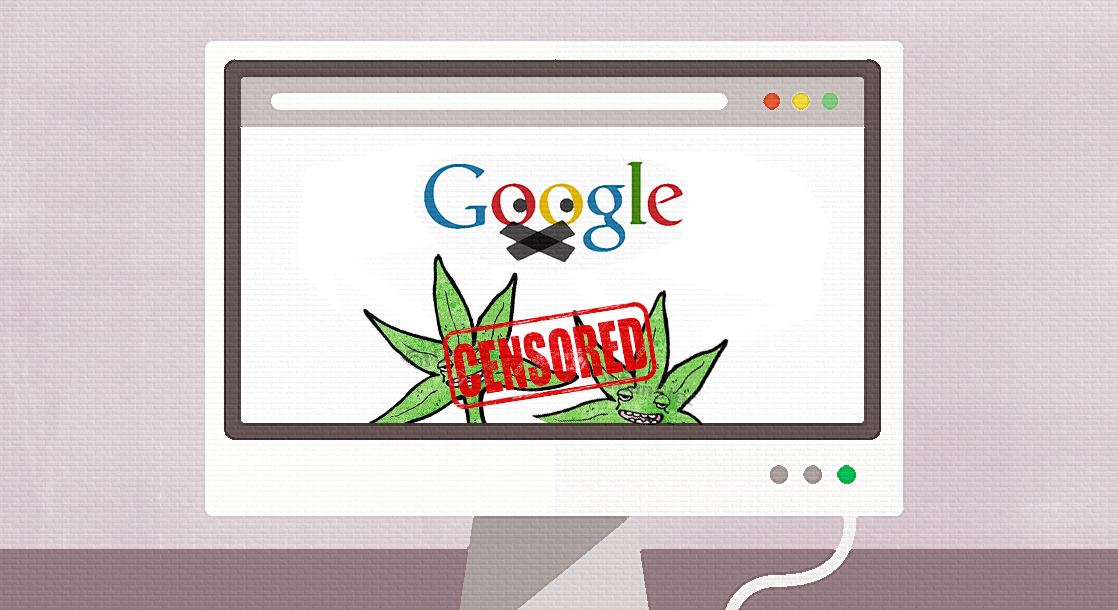Cannabis is the new thoughtcrime. An illicit keyword like “cannabis” is all it takes to get your ad deleted from Google.
Cannabis businesses have had enough and are speaking out against the tech monolith. Google is one of the world's favorite misspelled words — a googol is a numeral with 100 digits.
Developers are well on their way to making a googol in cash, however, they don't want cannabis to be part of it. Almost the entire bulk of the Google empire ($66 Billion in revenue) is profited from AdWords.
In 2000, Google launched AdWords, a remarkable advertising tool that uses algorithms to create unique geo-targeted ad campaigns.
Since then, the company has literally reshaped our daily lives—the way we choose services and products. Google's ad policy flags and censors sensitive material and now targets recreational cannabis specifically.
The policy bans “products or services marketed as facilitating recreational drug use” despite four states with recreational cannabis and half the nation with medical cannabis laws. The policy then gives the examples, “pipes, bongs, cannabis coffee shops.”
The policy goes even further, banning the “Promotion of instructional content about producing, purchasing, or using recreational drugs.”
Recently Google rejected seven ads from longtime client Vireo Health. The ads contained the keywords “medical marijuana” and “medical cannabis.” After Vireo released a statement slamming the ad policy, Google responded by pulling two additional ads which were previously approved.
"We are shocked and dismayed that Google chose to retaliate instead of engaging in a constructive dialogue," explained Ari Hoffnung, Chief Executive of Vireo Health.
Dr. Kyle Kingsley, founder of Vireo, slammed the policy.
“As a physician, it’s hard to understand why Google willingly accepts ads that promote highly addictive painkillers, like OxyContin, that are responsible for thousands of deaths each year, but knowingly rejects medical cannabis ads that could, in many cases, be a significantly safer therapeutic option for patients,” Kingsley stated.
Is it in direct violation of the First Amendment? Specifically, Google contradicts the free use of commercial speech as protected in the First Amendment:
“The commercial market place, like other spheres of our social and cultural life, provides a forum where ideas and information flourish. Some of the ideas and information are vital, some of slight worth.
But the general rule is that the speaker and the audience, not the government, assess the value of the information presented. Thus, even a communication that does no more than propose a commercial transaction is entitled to the coverage of the First Amendment.” (Edenfield v. Fane, 123 L. Ed. 2d 543, 113 S. Ct. 1792, 1798 (1993)).
Only federal agents like members of the Federal Trade Commission are exempt from all its protections, for instance in the event that they find deceptive speech.
The United States is notorious for imposing its laws in other parts of the globe. When MP3's came around, the US Digital Millenium Copyright Act was a futile attempt to curb the end of the album era of music. Google began enforcing the United States' DMCA law globally. Google is now imposing its policies that go beyond state-level cannabis laws.
“I think it is going to be challenging for Google to explain why it is comfortable accepting advertisements from companies that promote the sale of alcohol, knives, hatchets and infidelity, but is uncomfortable accepting ads from medical cannabis companies," Kingsley added.
“We don’t live in a black-and-white world, and Google ought to adopt more thoughtful and nuanced advertising policies.”
So just what exactly are we afraid of? Censorship has gone a little farther in President Putin's Russia. Roskomnadzor, Russia's internet watchdog, frequently deletes Wikipedia pages and other sites that dare to publish stories about cannabis, whether is historical or not.
Roskomnadzor deleted a Wikipedia page that used the unacceptable term “charas,” a traditional hashish dish. Like Google AdWords, Roskomnadzor searches for keywords that reference cannabis and other contraband.
The behemoth of Google isn't the only way to promote your cannabis business online. Facebook offers similar geo-specific ad tools, but the company is reportedly censoring cannabis ads as well. Several cannabis-friendly advertising options exist, including Mantis and 420 Network.











